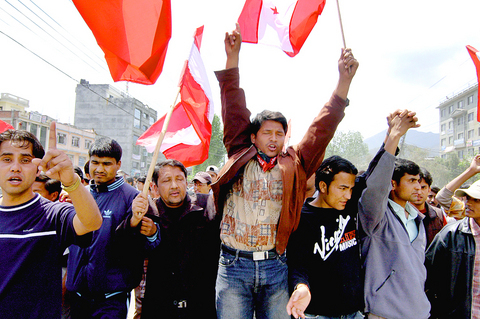Nepal's King Gyanendra, bowing to popular pressure, yesterday announced that he was handing back all executive power to the people.
In an address to the nation following over two weeks of anti-king protest demonstrations during which over a dozen people were shot dead, the 59-year old Nepalese monarch said: "We ask the seven agitating political party alliance to recommend the name of the person to become prime minister."
The king seized absolute power in February last year asking for three years to bring the derailed Nepalese multi-party democracy back on track.

PHOTO: AP
More than 100,000 pro-democracy protesters had earlier defied a government curfew and filled the streets on the outskirts of Nepal's capital, as the US ambassador warned that the king's regime could be nearing collapse.
Three separate groups of marchers converged on an area on the western edge of Kathmandu called Kalanki, where police shot three demonstrators dead on Thursday and wounded dozens more.
A reporter estimated the crowd at more than 100,000; independent Kantipur television said there were about 150,000.
They faced off against security forces that had ringed the city issued with shoot-on-sight orders against anyone who tried to enter the curfew zone.
As the tension grew, so did the international pressure on the king.
Meanwhile, two senior opposition leaders involved in negotiations with communist rebels were arrested as they tried to return to Kathmandu, said Amrit Bohara of the Community Part of Nepal.
The two men, Jhala Nath Khanal and Bamdev Gautam, both leaders of the party, have been important conduits in negotiations between Nepal's seven main opposition parties and the Maoist insurgents who control much of the countryside.

AIR SUPPORT: The Ministry of National Defense thanked the US for the delivery, adding that it was an indicator of the White House’s commitment to the Taiwan Relations Act Deputy Minister of National Defense Po Horng-huei (柏鴻輝) and Representative to the US Alexander Yui on Friday attended a delivery ceremony for the first of Taiwan’s long-awaited 66 F-16C/D Block 70 jets at a Lockheed Martin Corp factory in Greenville, South Carolina. “We are so proud to be the global home of the F-16 and to support Taiwan’s air defense capabilities,” US Representative William Timmons wrote on X, alongside a photograph of Taiwanese and US officials at the event. The F-16C/D Block 70 jets Taiwan ordered have the same capabilities as aircraft that had been upgraded to F-16Vs. The batch of Lockheed Martin

US President Donald Trump yesterday announced sweeping "reciprocal tariffs" on US trading partners, including a 32 percent tax on goods from Taiwan that is set to take effect on Wednesday. At a Rose Garden event, Trump declared a 10 percent baseline tax on imports from all countries, with the White House saying it would take effect on Saturday. Countries with larger trade surpluses with the US would face higher duties beginning on Wednesday, including Taiwan (32 percent), China (34 percent), Japan (24 percent), South Korea (25 percent), Vietnam (46 percent) and Thailand (36 percent). Canada and Mexico, the two largest US trading

GRIDLOCK: The National Fire Agency’s Special Search and Rescue team is on standby to travel to the countries to help out with the rescue effort A powerful earthquake rocked Myanmar and neighboring Thailand yesterday, killing at least three people in Bangkok and burying dozens when a high-rise building under construction collapsed. Footage shared on social media from Myanmar’s second-largest city showed widespread destruction, raising fears that many were trapped under the rubble or killed. The magnitude 7.7 earthquake, with an epicenter near Mandalay in Myanmar, struck at midday and was followed by a strong magnitude 6.4 aftershock. The extent of death, injury and destruction — especially in Myanmar, which is embroiled in a civil war and where information is tightly controlled at the best of times —

China's military today said it began joint army, navy and rocket force exercises around Taiwan to "serve as a stern warning and powerful deterrent against Taiwanese independence," calling President William Lai (賴清德) a "parasite." The exercises come after Lai called Beijing a "foreign hostile force" last month. More than 10 Chinese military ships approached close to Taiwan's 24 nautical mile (44.4km) contiguous zone this morning and Taiwan sent its own warships to respond, two senior Taiwanese officials said. Taiwan has not yet detected any live fire by the Chinese military so far, one of the officials said. The drills took place after US Secretary